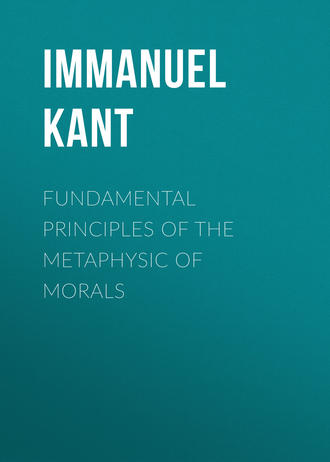 полная версия
полная версияFundamental Principles of the Metaphysic of Morals
These are a few of the many actual duties, or at least what we regard as such, which obviously fall into two classes on the one principle that we have laid down. We must be able to will that a maxim of our action should be a universal law. This is the canon of the moral appreciation of the action generally. Some actions are of such a character that their maxim cannot without contradiction be even conceived as a universal law of nature, far from it being possible that we should will that it should be so. In others this intrinsic impossibility is not found, but still it is impossible to will that their maxim should be raised to the universality of a law of nature, since such a will would contradict itself It is easily seen that the former violate strict or rigorous (inflexible) duty; the latter only laxer (meritorious) duty. Thus it has been completely shown how all duties depend as regards the nature of the obligation (not the object of the action) on the same principle.
If now we attend to ourselves on occasion of any transgression of duty, we shall find that we in fact do not will that our maxim should be a universal law, for that is impossible for us; on the contrary, we will that the opposite should remain a universal law, only we assume the liberty of making an exception in our own favour or (just for this time only) in favour of our inclination. Consequently if we considered all cases from one and the same point of view, namely, that of reason, we should find a contradiction in our own will, namely, that a certain principle should be objectively necessary as a universal law, and yet subjectively should not be universal, but admit of exceptions. As however we at one moment regard our action from the point of view of a will wholly conformed to reason, and then again look at the same action from the point of view of a will affected by inclination, there is not really any contradiction, but an antagonism of inclination to the precept of reason, whereby the universality of the principle is changed into a mere generality, so that the practical principle of reason shall meet the maxim half way. Now, although this cannot be justified in our own impartial judgement, yet it proves that we do really recognise the validity of the categorical imperative and (with all respect for it) only allow ourselves a few exceptions, which we think unimportant and forced from us.
We have thus established at least this much, that if duty is a conception which is to have any import and real legislative authority for our actions, it can only be expressed in categorical and not at all in hypothetical imperatives. We have also, which is of great importance, exhibited clearly and definitely for every practical application the content of the categorical imperative, which must contain the principle of all duty if there is such a thing at all. We have not yet, however, advanced so far as to prove a priori that there actually is such an imperative, that there is a practical law which commands absolutely of itself and without any other impulse, and that the following of this law is duty.
With the view of attaining to this, it is of extreme importance to remember that we must not allow ourselves to think of deducing the reality of this principle from the particular attributes of human nature. For duty is to be a practical, unconditional necessity of action; it must therefore hold for all rational beings (to whom an imperative can apply at all), and for this reason only be also a law for all human wills. On the contrary, whatever is deduced from the particular natural characteristics of humanity, from certain feelings and propensions, nay, even, if possible, from any particular tendency proper to human reason, and which need not necessarily hold for the will of every rational being; this may indeed supply us with a maxim, but not with a law; with a subjective principle on which we may have a propension and inclination to act, but not with an objective principle on which we should be enjoined to act, even though all our propensions, inclinations, and natural dispositions were opposed to it. In fact, the sublimity and intrinsic dignity of the command in duty are so much the more evident, the less the subjective impulses favour it and the more they oppose it, without being able in the slightest degree to weaken the obligation of the law or to diminish its validity.
Here then we see philosophy brought to a critical position, since it has to be firmly fixed, notwithstanding that it has nothing to support it in heaven or earth. Here it must show its purity as absolute director of its own laws, not the herald of those which are whispered to it by an implanted sense or who knows what tutelary nature. Although these may be better than nothing, yet they can never afford principles dictated by reason, which must have their source wholly a priori and thence their commanding authority, expecting everything from the supremacy of the law and the due respect for it, nothing from inclination, or else condemning the man to self-contempt and inward abhorrence.
Thus every empirical element is not only quite incapable of being an aid to the principle of morality, but is even highly prejudicial to the purity of morals, for the proper and inestimable worth of an absolutely good will consists just in this, that the principle of action is free from all influence of contingent grounds, which alone experience can furnish. We cannot too much or too often repeat our warning against this lax and even mean habit of thought which seeks for its principle amongst empirical motives and laws; for human reason in its weariness is glad to rest on this pillow, and in a dream of sweet illusions (in which, instead of Juno, it embraces a cloud) it substitutes for morality a bastard patched up from limbs of various derivation, which looks like anything one chooses to see in it, only not like virtue to one who has once beheld her in her true form. 11
The question then is this: "Is it a necessary law for all rational beings that they should always judge of their actions by maxims of which they can themselves will that they should serve as universal laws?" If it is so, then it must be connected (altogether a priori) with the very conception of the will of a rational being generally. But in order to discover this connexion we must, however reluctantly, take a step into metaphysic, although into a domain of it which is distinct from speculative philosophy, namely, the metaphysic of morals. In a practical philosophy, where it is not the reasons of what happens that we have to ascertain, but the laws of what ought to happen, even although it never does, i.e., objective practical laws, there it is not necessary to inquire into the reasons why anything pleases or displeases, how the pleasure of mere sensation differs from taste, and whether the latter is distinct from a general satisfaction of reason; on what the feeling of pleasure or pain rests, and how from it desires and inclinations arise, and from these again maxims by the co-operation of reason: for all this belongs to an empirical psychology, which would constitute the second part of physics, if we regard physics as the philosophy of nature, so far as it is based on empirical laws. But here we are concerned with objective practical laws and, consequently, with the relation of the will to itself so far as it is determined by reason alone, in which case whatever has reference to anything empirical is necessarily excluded; since if reason of itself alone determines the conduct (and it is the possibility of this that we are now investigating), it must necessarily do so a priori.
The will is conceived as a faculty of determining oneself to action in accordance with the conception of certain laws. And such a faculty can be found only in rational beings. Now that which serves the will as the objective ground of its self-determination is the end, and, if this is assigned by reason alone, it must hold for all rational beings. On the other hand, that which merely contains the ground of possibility of the action of which the effect is the end, this is called the means. The subjective ground of the desire is the spring, the objective ground of the volition is the motive; hence the distinction between subjective ends which rest on springs, and objective ends which depend on motives valid for every rational being. Practical principles are formal when they abstract from all subjective ends; they are material when they assume these, and therefore particular springs of action. The ends which a rational being proposes to himself at pleasure as effects of his actions (material ends) are all only relative, for it is only their relation to the particular desires of the subject that gives them their worth, which therefore cannot furnish principles universal and necessary for all rational beings and for every volition, that is to say practical laws. Hence all these relative ends can give rise only to hypothetical imperatives.
Supposing, however, that there were something whose existence has in itself an absolute worth, something which, being an end in itself, could be a source of definite laws; then in this and this alone would lie the source of a possible categorical imperative, i.e., a practical law.
Now I say: man and generally any rational being exists as an end in himself, not merely as a means to be arbitrarily used by this or that will, but in all his actions, whether they concern himself or other rational beings, must be always regarded at the same time as an end. All objects of the inclinations have only a conditional worth, for if the inclinations and the wants founded on them did not exist, then their object would be without value. But the inclinations, themselves being sources of want, are so far from having an absolute worth for which they should be desired that on the contrary it must be the universal wish of every rational being to be wholly free from them. Thus the worth of any object which is to be acquired by our action is always conditional. Beings whose existence depends not on our will but on nature's, have nevertheless, if they are irrational beings, only a relative value as means, and are therefore called things; rational beings, on the contrary, are called persons, because their very nature points them out as ends in themselves, that is as something which must not be used merely as means, and so far therefore restricts freedom of action (and is an object of respect). These, therefore, are not merely subjective ends whose existence has a worth for us as an effect of our action, but objective ends, that is, things whose existence is an end in itself; an end moreover for which no other can be substituted, which they should subserve merely as means, for otherwise nothing whatever would possess absolute worth; but if all worth were conditioned and therefore contingent, then there would be no supreme practical principle of reason whatever.
If then there is a supreme practical principle or, in respect of the human will, a categorical imperative, it must be one which, being drawn from the conception of that which is necessarily an end for everyone because it is an end in itself, constitutes an objective principle of will, and can therefore serve as a universal practical law. The foundation of this principle is: rational nature exists as an end in itself. Man necessarily conceives his own existence as being so; so far then this is a subjective principle of human actions. But every other rational being regards its existence similarly, just on the same rational principle that holds for me: 12 so that it is at the same time an objective principle, from which as a supreme practical law all laws of the will must be capable of being deduced. Accordingly the practical imperative will be as follows: So act as to treat humanity, whether in thine own person or in that of any other, in every case as an end withal, never as means only. We will now inquire whether this can be practically carried out.
To abide by the previous examples:
Firstly, under the head of necessary duty to oneself: He who contemplates suicide should ask himself whether his action can be consistent with the idea of humanity as an end in itself. If he destroys himself in order to escape from painful circumstances, he uses a person merely as a mean to maintain a tolerable condition up to the end of life. But a man is not a thing, that is to say, something which can be used merely as means, but must in all his actions be always considered as an end in himself. I cannot, therefore, dispose in any way of a man in my own person so as to mutilate him, to damage or kill him. (It belongs to ethics proper to define this principle more precisely, so as to avoid all misunderstanding, e. g., as to the amputation of the limbs in order to preserve myself, as to exposing my life to danger with a view to preserve it, etc. This question is therefore omitted here.)
Secondly, as regards necessary duties, or those of strict obligation, towards others: He who is thinking of making a lying promise to others will see at once that he would be using another man merely as a mean, without the latter containing at the same time the end in himself. For he whom I propose by such a promise to use for my own purposes cannot possibly assent to my mode of acting towards him and, therefore, cannot himself contain the end of this action. This violation of the principle of humanity in other men is more obvious if we take in examples of attacks on the freedom and property of others. For then it is clear that he who transgresses the rights of men intends to use the person of others merely as a means, without considering that as rational beings they ought always to be esteemed also as ends, that is, as beings who must be capable of containing in themselves the end of the very same action. 13
Thirdly, as regards contingent (meritorious) duties to oneself: It is not enough that the action does not violate humanity in our own person as an end in itself, it must also harmonize with it. Now there are in humanity capacities of greater perfection, which belong to the end that nature has in view in regard to humanity in ourselves as the subject: to neglect these might perhaps be consistent with the maintenance of humanity as an end in itself, but not with the advancement of this end.
Fourthly, as regards meritorious duties towards others: The natural end which all men have is their own happiness. Now humanity might indeed subsist, although no one should contribute anything to the happiness of others, provided he did not intentionally withdraw anything from it; but after all this would only harmonize negatively not positively with humanity as an end in itself, if every one does not also endeavour, as far as in him lies, to forward the ends of others. For the ends of any subject which is an end in himself ought as far as possible to be my ends also, if that conception is to have its full effect with me.
This principle, that humanity and generally every rational nature is an end in itself (which is the supreme limiting condition of every man's freedom of action), is not borrowed from experience, firstly, because it is universal, applying as it does to all rational beings whatever, and experience is not capable of determining anything about them; secondly, because it does not present humanity as an end to men (subjectively), that is as an object which men do of themselves actually adopt as an end; but as an objective end, which must as a law constitute the supreme limiting condition of all our subjective ends, let them be what we will; it must therefore spring from pure reason. In fact the objective principle of all practical legislation lies (according to the first principle) in the rule and its form of universality which makes it capable of being a law (say, e. g., a law of nature); but the subjective principle is in the end; now by the second principle the subject of all ends is each rational being, inasmuch as it is an end in itself. Hence follows the third practical principle of the will, which is the ultimate condition of its harmony with universal practical reason, viz.: the idea of the will of every rational being as a universally legislative will.
On this principle all maxims are rejected which are inconsistent with the will being itself universal legislator. Thus the will is not subject simply to the law, but so subject that it must be regarded as itself giving the law and, on this ground only, subject to the law (of which it can regard itself as the author).
In the previous imperatives, namely, that based on the conception of the conformity of actions to general laws, as in a physical system of nature, and that based on the universal prerogative of rational beings as ends in themselves- these imperatives, just because they were conceived as categorical, excluded from any share in their authority all admixture of any interest as a spring of action; they were, however, only assumed to be categorical, because such an assumption was necessary to explain the conception of duty. But we could not prove independently that there are practical propositions which command categorically, nor can it be proved in this section; one thing, however, could be done, namely, to indicate in the imperative itself, by some determinate expression, that in the case of volition from duty all interest is renounced, which is the specific criterion of categorical as distinguished from hypothetical imperatives. This is done in the present (third) formula of the principle, namely, in the idea of the will of every rational being as a universally legislating will.
For although a will which is subject to laws may be attached to this law by means of an interest, yet a will which is itself a supreme lawgiver so far as it is such cannot possibly depend on any interest, since a will so dependent would itself still need another law restricting the interest of its self-love by the condition that it should be valid as universal law.
Thus the principle that every human will is a will which in all its maxims gives universal laws, 14 provided it be otherwise justified, would be very well adapted to be the categorical imperative, in this respect, namely, that just because of the idea of universal legislation it is not based on interest, and therefore it alone among all possible imperatives can be unconditional. Or still better, converting the proposition, if there is a categorical imperative (i.e., a law for the will of every rational being), it can only command that everything be done from maxims of one's will regarded as a will which could at the same time will that it should itself give universal laws, for in that case only the practical principle and the imperative which it obeys are unconditional, since they cannot be based on any interest.
Looking back now on all previous attempts to discover the principle of morality, we need not wonder why they all failed. It was seen that man was bound to laws by duty, but it was not observed that the laws to which he is subject are only those of his own giving, though at the same time they are universal, and that he is only bound to act in conformity with his own will; a will, however, which is designed by nature to give universal laws. For when one has conceived man only as subject to a law (no matter what), then this law required some interest, either by way of attraction or constraint, since it did not originate as a law from his own will, but this will was according to a law obliged by something else to act in a certain manner. Now by this necessary consequence all the labour spent in finding a supreme principle of duty was irrevocably lost. For men never elicited duty, but only a necessity of acting from a certain interest. Whether this interest was private or otherwise, in any case the imperative must be conditional and could not by any means be capable of being a moral command. I will therefore call this the principle of autonomy of the will, in contrast with every other which I accordingly reckon as heteronomy.
The conception of the will of every rational being as one which must consider itself as giving in all the maxims of its will universal laws, so as to judge itself and its actions from this point of view- this conception leads to another which depends on it and is very fruitful, namely that of a kingdom of ends.
By a kingdom I understand the union of different rational beings in a system by common laws. Now since it is by laws that ends are determined as regards their universal validity, hence, if we abstract from the personal differences of rational beings and likewise from all the content of their private ends, we shall be able to conceive all ends combined in a systematic whole (including both rational beings as ends in themselves, and also the special ends which each may propose to himself), that is to say, we can conceive a kingdom of ends, which on the preceding principles is possible.
For all rational beings come under the law that each of them must treat itself and all others never merely as means, but in every case at the same time as ends in themselves. Hence results a systematic union of rational being by common objective laws, i.e., a kingdom which may be called a kingdom of ends, since what these laws have in view is just the relation of these beings to one another as ends and means. It is certainly only an ideal.
A rational being belongs as a member to the kingdom of ends when, although giving universal laws in it, he is also himself subject to these laws. He belongs to it as sovereign when, while giving laws, he is not subject to the will of any other.
A rational being must always regard himself as giving laws either as member or as sovereign in a kingdom of ends which is rendered possible by the freedom of will. He cannot, however, maintain the latter position merely by the maxims of his will, but only in case he is a completely independent being without wants and with unrestricted power adequate to his will.
Morality consists then in the reference of all action to the legislation which alone can render a kingdom of ends possible. This legislation must be capable of existing in every rational being and of emanating from his will, so that the principle of this will is never to act on any maxim which could not without contradiction be also a universal law and, accordingly, always so to act that the will could at the same time regard itself as giving in its maxims universal laws. If now the maxims of rational beings are not by their own nature coincident with this objective principle, then the necessity of acting on it is called practical necessitation, i.e., duty. Duty does not apply to the sovereign in the kingdom of ends, but it does to every member of it and to all in the same degree.
The practical necessity of acting on this principle, i.e., duty, does not rest at all on feelings, impulses, or inclinations, but solely on the relation of rational beings to one another, a relation in which the will of a rational being must always be regarded as legislative, since otherwise it could not be conceived as an end in itself. Reason then refers every maxim of the will, regarding it as legislating universally, to every other will and also to every action towards oneself; and this not on account of any other practical motive or any future advantage, but from the idea of the dignity of a rational being, obeying no law but that which he himself also gives.
In the kingdom of ends everything has either value or dignity. Whatever has a value can be replaced by something else which is equivalent; whatever, on the other hand, is above all value, and therefore admits of no equivalent, has a dignity.
Whatever has reference to the general inclinations and wants of mankind has a market value; whatever, without presupposing a want, corresponds to a certain taste, that is to a satisfaction in the mere purposeless play of our faculties, has a fancy value; but that which constitutes the condition under which alone anything can be an end in itself, this has not merely a relative worth, i.e., value, but an intrinsic worth, that is, dignity.
Now morality is the condition under which alone a rational being can be an end in himself, since by this alone is it possible that he should be a legislating member in the kingdom of ends. Thus morality, and humanity as capable of it, is that which alone has dignity. Skill and diligence in labour have a market value; wit, lively imagination, and humour, have fancy value; on the other hand, fidelity to promises, benevolence from principle (not from instinct), have an intrinsic worth. Neither nature nor art contains anything which in default of these it could put in their place, for their worth consists not in the effects which spring from them, not in the use and advantage which they secure, but in the disposition of mind, that is, the maxims of the will which are ready to manifest themselves in such actions, even though they should not have the desired effect. These actions also need no recommendation from any subjective taste or sentiment, that they may be looked on with immediate favour and satisfaction: they need no immediate propension or feeling for them; they exhibit the will that performs them as an object of an immediate respect, and nothing but reason is required to impose them on the will; not to flatter it into them, which, in the case of duties, would be a contradiction. This estimation therefore shows that the worth of such a disposition is dignity, and places it infinitely above all value, with which it cannot for a moment be brought into comparison or competition without as it were violating its sanctity.









